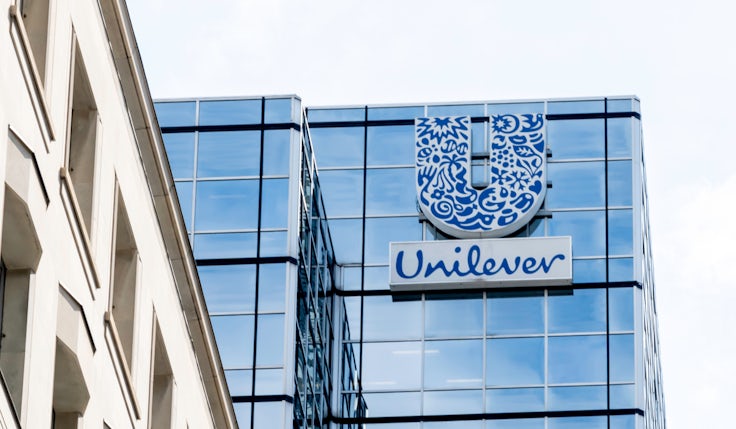Unilever injects extra £442m into marketing amid ‘digital hubs’ investment
The FMCG giant has invested in 29 digital marketing and ecommerce hubs to ensure the business succeeds in the “channel of the future.”
 Unilever has confirmed its brand and marketing investment “will grow again in 2023”, after the FMCG giant ramped up spend by €500m (£442m) last year.
Unilever has confirmed its brand and marketing investment “will grow again in 2023”, after the FMCG giant ramped up spend by €500m (£442m) last year.
More than 80% of Unilever’s 2022 marketing spend went directly into media. Media investment as a percentage of turnover increased in the beauty and wellbeing, personal care and home care categories, despite high turnovers driven by price.
Another major area of investment was in digital. The business has invested in 29 digital marketing, media and ecommerce hubs, known as DMCs. These hubs are aligned to Unilever’s five business units, established last year.
The DMCs comprise of experts in media, data-driven marketing and sales, and are designed to deliver “seamless consumer experiences” and optimise investment.
We are taking price increases responsibly…thereby allowing us to increase investment behind our brands.
Alan Jope, Unilever
“These DMCs represent a key investment to ensure that Unilever continues to win in this important channel of the future,” outgoing CEO Alan Jope told investors today (9 February).
The FMCG giant’s “first priority is to invest in the business”, added chief financial officer Graeme Pitkethly. Despite inflationary pressures, he explained the company made a “very substantial investment” in marketing this year to ensure the strength of its brands in a challenging environment.
In 2021, Unilever’s brand and marketing investment was around €6.9bn (£6.12bn). Brand investment did fall by 10 basis points last year as a percentage of turnover. However, Pitkethly claimed this was “less useful” as a measure given turnover was driven significantly by pricing in 2022.
Last year, Unilever’s sales grew 9%, driven by price growth of 11.3%. Turnover rose by 14.5% to €60.1bn (£53bn) in 2022, while profit increased marginally by 0.5% to €9.7bn (£8.6bn).
“Our growth has been underpinned by bigger, better innovation and a relentless focus on functional product superiority,” said Jope.
Unilever’s CMO of ice cream on prioritising ‘product superiority’ over purpose
Across the business, volumes declined 2.1% in 2022, as inflation constrained consumer spending. In the last three months of the year, volumes in Europe declined by 6.8% across all Unilever’s business groups, while price increased by 13.2%. Pitkethly did note the business had seen share gains by private label in Europe “in most categories.”
Despite upping prices significantly in the fourth quarter across Europe, Unilever maintains it is taking the right approach to price.
“We are taking price increases responsibly…thereby allowing us to increase investment behind our brands,” Jope added.
As consumers have returned to in-person shopping, Unilever has seen “more modest growth” in B2C ecommerce, compared to its B2B channels. Despite this softening of demand, Jope reported the business remains committed to digital and ecommerce as a “key source” of future growth.
Unilever’s priority digital commerce channels grew by 23% in 2022 and now make up 15% of turnover. The company’s “billion+ Euro” brands, which account for 53% of group turnover, delivered underlying sales growth of 10.9%. This growth was led by strong performances from OMO, Hellmann’s, Rexona, Sunsilk and Magnum.
Simpler structure
Unilever restructured its business to create five units in July last year. While it is too early to fully judge the success, Jope claimed the new structure was already delivering results.
“We’re already seeing benefits in the speed that decisions are being made at and sharper accountability for improving business performance,” he said.
In November 2022, president of Unilever’s ice cream business Matt Close told Marketing Week he was confident in how the new structure would deliver for the business.
“It’s exciting for us, because it really puts accountability in the hands of the people who have a deep understanding of the business,” Close said.
Ice cream was held up by Jope as an example of a business unit taking “sharper” choices following the restructure, after it took the “tough” decision to move out of unprofitable areas.
Among the wider changes last year, Unilever’s top marketer Conny Braams had marketing dropped from her title, becoming chief digital and commercial officer. She told Marketing Week the decision was motivated by a desire to remove “silos” between marketing and sales, and create a “consistent consumer experience” across all touchpoints, both traditional and digital.
Going into 2023, Jope is confident the restructured business has the ability to deliver.
“All of our business groups…have built plans that involve aggressive savings, continued pricing and therefore the ability to step up their brand and marketing investment,” he said, adding he expects the biggest recipient of investment to be the beauty and wellbeing business.
Jope will depart as Unilever CEO in July, with former Heinz finance boss Hein Schumacher announced as his successor last month.





Comments